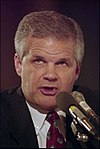This article relies largely or entirely on a single source .(November 2021) |
| |||||||||||||||||
| |||||||||||||||||
 Parish results Long: 50–60% 60–70% 70–80% Jenkins: 50–60% | |||||||||||||||||
| |||||||||||||||||
| Elections in Louisiana |
|---|
 |
The 1980 United States Senate election in Louisiana was held on September 13, 1980. Incumbent Democrat Russell B. Long won the primary with 57.64% of the vote and avoided a runoff.

